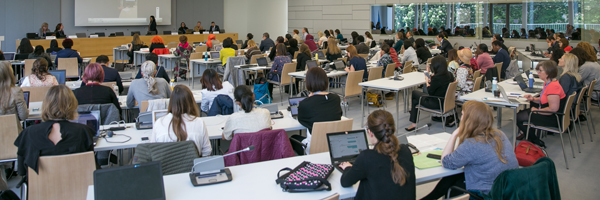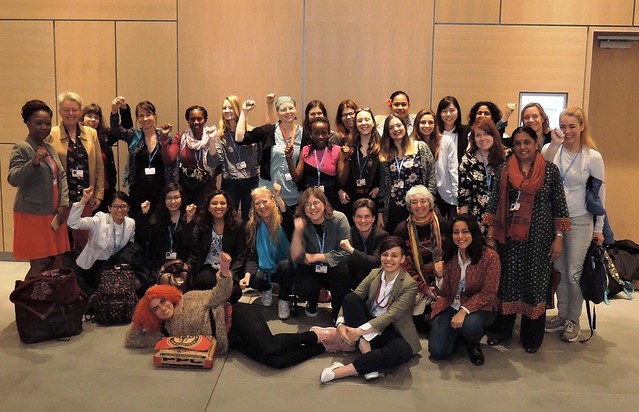Gender activities leading up to COP24 in Katowice

SB48.2 climate talks in Bangkok 4-9 September
As the pace of the negotiations at the SB48 meeting in Bonn was very slow, the session was suspended and is currently be continued in Bangkok, Thailand from 4th to 9th September.
The session focus specifically on agenda items related to the Work Programme of the Paris Agreement. The Work Programme of the Paris Agreement (also known as "rulebook") is supposed to put flesh to the bones of the Paris Agreement. Civil society organisations hope that Parties will finally agree on its draft text in Bangkok and achieve substantial progress ahead of COP24 in Katowice.
After half of the negotiations feelings are mixed. On the one hand Parties started working quickly avoiding anything that prolongs the opening sessions. On the other hand most items (on NDCs, tarnsparency framework, global stocktake or Article 6 on cooperative approaches) are far away from actual draft decision texts. Many questions are still open: What is the scope of the Nationally Determined Contributions or of the reporting in the Transparency Framework? How will the Global Stocktake actually look like and who will be allowed to contribute? What are these non-market approaches in the Article 6 of the Paris Agreement? Ho to ensure safeguards for human rights, indigenous peoples rights and gender equality in market approaches? What finance will be put on the table after 2025 from developed countries? And last but not least how can ambitions be raised to ensure the main obejctive of the Paris Agreement well below 2°C?
The Women and Gender Constituency has prepared key recommendations for the different articles of the Paris Agreement that are negotiated under downloads.
SB48 climate talks in Bonn
The team of the International Secretariat and several of GenderCC's members were represented at the SB48 negotiations from 30 April to 10 May, 2018 in Bonn, Germany.
2018 is crucial for the UNFCCC in terms of defining the implementation guidelines of the Paris Agreement that will shape international climate policies for decades to come. The SB48 sessions in May laid the ground for a work program that is to be adopted at COP24 in Katowice, Poland in December. GenderCC attended the SB48 meeting to advocate for the integration of gender equality throughout all negotiation issues and the implementation of the Paris Agreement. For gender advocates, the SB48 sessions were of particular interest due to several in-session events on gender and climate change mandated under the Lima Work Programme and the recently adopted Gender Action Plan.
The first part of the Gender Workshop requested by the Gender Action Plan focused on sex-disaggregated data and the analysis of gender differentiated impacts of climate change as well as on tools and methodologies to support the integration of gender into climate policies. In the course of this workshop, GenderCC's Gotelind Alber presented the Gender Assessment and Monitoring of Mitigation and Adaptation policies (GAMMA), a methodology developed as part of the GUCCI project. This methodology supports decision-makers and planners to develop and implement gender-responsive climate policies on national and sub-national levels.
The second part of the Gender Workshop addressed ways for enhancing the equal participation of women in national delegations and the various bodies of the UNFCCC.
Additionally, a Gender Dialogue was held that invited the chairs of the UNFCCC constituted bodies to discuss their efforts to achieve gender balance and to integrate gender aspects in their work.
GenderCC side event
GenderCC hosted a side event during the SB48 meeting titled "New approaches to gender analysis to support gender responsive national climate policy". The event presented the findings of an ongoing research project that GenderCC is currently conducting in partnership with the Wuppertal Institute and the Insitute for Social-Ecological Research (ISOE) on behalf of the German Environment Agency. The project aims at developing new approaches to gendering climate policy-making in Germany. In particular the Gender Impact Assessment (GIA) and its application to climate policies in industrialised countries was presented as a fruitful instrument for advancing the consideration of gender aspects when planning for climate action. The findings of the project will be applicable also to other industrialised countries. The nexus of gender and climate change is not only relevant in developing countries, but of high relevance also in developed countries as GenderCC was able to show in an extensive literature review published earlier this year in the course of the same project. The speakers included Gotelind Alber (GenderCC), Arn Sauer (German Federal Environment Agency), Diana Hummel (ISOE) and Meike Spitzner (Wuppertal Institute).
Women and Gender Constituency joint statement on the outcomes of SB48
The Women and Gender Constituency (WGC), the observer group of all women and gender non-governmental organisations involved in the UNFCCC process, has released a joint statement on the outcomes of the SB48 meeting. It explains in depth the results of the negotiations on issues such as the Local Communities and Indigenous Peoples Platform, the Talanoa Dialogue and the state of implementation of the Gender Action Plan. The WGC strongly opposes a bill adopted by the Polish government prior to COP24 which will restrict the right of free assembly and give the Polish authorities access to extensive private data of all COP24 participants.
You can read the statement here.
Webinar in preparation for the SB48 climate talks
2018 is a crucial year for international climate politics. During the webinar on April 24, gender and climate activists from around the globe reported on different aspects of the UNFCCC climate negotiations and gender entry points. We took a close look at the current status of REDD+ and how the program evolves in Indonesia and Ecuador, talked about aspects related to agriculture and gender, the Gender Action Plan and discussed the integration of gender and human rights into the implementation guidelines for the Paris Agreement.
Moderation: Nanna Birk, LIFE e.V.
Speakers:
Dinda Nuur Annisaa Yura (Solidaritas Perempuan)
Melissa Moreano (Geografía Crítica Ecuador)
Ndivile Mokoena (Gendercc Southern Africa - Women For Climate Justice Network
Patricia Bohland and Lisa Göldner (GenderCC - Women for Climate Justice e.V.)
The project Not without us! Climate justice and gender justice in international climate politics is supported by Rosa-Luxemburg-Stiftung

